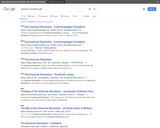
The American Revolution Teacher Guide. Core Knowledge Sequence History and Geography 4
- Subject:
- History
- U.S. History
- Material Type:
- Textbook
- Date Added:
- 08/25/2019

The American Revolution Teacher Guide. Core Knowledge Sequence History and Geography 4

Have you ever stopped to think about the incredible risks the Founding Founders took when they rebelled against British authority? They were starting a war with the greatest military power of the time even though they did not have a mighty fighting force themselves. And they were fighting for a type of government that most people thought was impossible. In this video mini-course, Professor Sarah Burns of the Rochester Institute of Technology explains the historical and philosophical context of the American Revolution from the changing role of the British army in the colonies to Radical Whig theory.
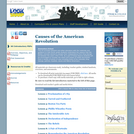
This kit provides teachers and other educators with the materials and guidance to help fourth grade students understand the reasons that the British colonists elected to declare their independence from King George III between the years 1763-1776. As a part of these lessons students will be encouraged to consider the intent and impact of media documents from a variety of points of view including those of the colonists, King George, patriots, loyalists, slaves and Native Americans.
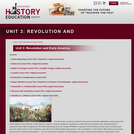
The Revolution and Early America Unit covers the standard eighteenth century topics that would appear in any textbook. These lessons, however, will push students to dig deeper as they read the documents and develop historical arguments about topics ranging from the Great Awakening (why was George Whitefield so popular?) to the Stamp Act (why were Colonists upset about the Stamp Act?) to the Constitution (why did the Founding Fathers keep slavery in the Constitution?). Each lesson offers primary documents that promote conflicting interpretations. The unit will introduce students to historiography, as they contrast Bernard Bailyn's interpretaton of the Declaration of Independence to Howard Zinn's account. These lessons will emphasize the historical reading skills students will practice all year.
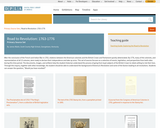
This collection uses primary sources to explore the events that led up to the American Revolutionary War. Digital Public Library of America Primary Source Sets are designed to help students develop their critical thinking skills and draw diverse material from libraries, archives, and museums across the United States. Each set includes an overview, ten to fifteen primary sources, links to related resources, and a teaching guide. These sets were created and reviewed by the teachers on the DPLA's Education Advisory Committee.

By the end of this section, you will be able to:Explain the purpose of the 1765 Stamp ActDescribe the colonial responses to the Stamp Act
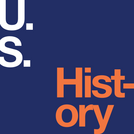
U.S. History is designed to meet the scope and sequence requirements of most introductory courses. The text provides a balanced approach to U.S. history, considering the people, events, and ideas that have shaped the United States from both the top down (politics, economics, diplomacy) and bottom up (eyewitness accounts, lived experience). U.S. History covers key forces that form the American experience, with particular attention to issues of race, class, and gender.Senior Contributing AuthorsP. Scott Corbett, Ventura CollegeVolker Janssen, California State University, FullertonJohn M. Lund, Keene State CollegeTodd Pfannestiel, Clarion UniversityPaul Vickery, Oral Roberts UniversitySylvie Waskiewicz
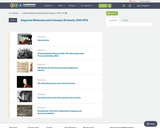
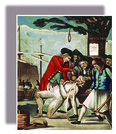
Confronting the National Debt: The Aftermath of the French and Indian WarThe Stamp Act and the Sons and Daughters of LibertyThe Townshend Acts and Colonial ProtestThe Destruction of the Tea and the Coercive ActsDisaffection: The First Continental Congress and American Identity

By the end of this section, you will be able to:Explain the purpose of the 1765 Stamp ActDescribe the colonial responses to the Stamp Act

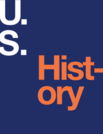
U.S. History is designed for a two-semester American history sequence. It is traditional in coverage, following a roughly chronological outline, and using a balanced approach that includes political, economic, social, and cultural developments. At the same time, the book includes a number of innovative and interactive features designed to enhance student learning. Instructors can also customize the book, adapting it to the approach that works best in their classroom.